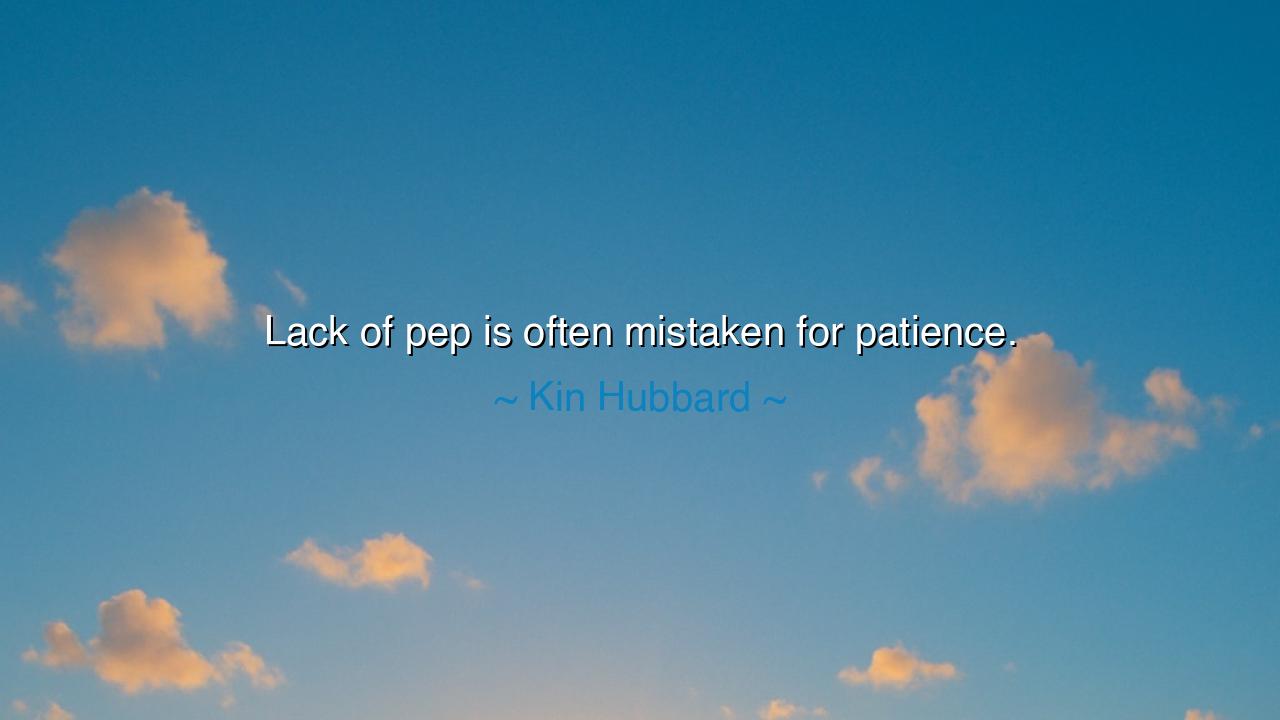
Lack of pep is often mistaken for patience.






Kin Hubbard, the sharp-witted observer of human nature, once declared: “Lack of pep is often mistaken for patience.” At first glance, this seems almost playful, a jest tossed with a smile. Yet beneath it lies a warning and a lesson, for he reveals how easily mankind confuses weakness with virtue, inaction with wisdom. True patience is not idleness, but strength under control. It is not the absence of motion, but the mastery of it. To sit still because one is weary or indifferent is not patience—it is simply a lack of pep, a fading of vitality mistaken for depth.
When Hubbard speaks of “lack of pep,” he points to that state of lethargy, when one avoids action not out of foresight, but out of sloth or fear. Many cloak this hesitation in noble garments, claiming they are being patient, waiting for the right time, holding back in wisdom. But their hearts are not steady in the fire of trial; they are simply unwilling to rise. True patience is active. It is the warrior who holds his ground with discipline, not the one too weary to lift his sword. It is the farmer who waits for the harvest, tending the soil daily, not the one who neglects his field and calls it waiting.
Consider the story of George Washington at Valley Forge. The winter was merciless, his army ragged and starving, and the temptation to despair was strong. Yet his patience was not the stillness of weakness, but the strength to endure. He drilled his men, reorganized his camp, and waited for the spring. Many at the time might have confused simple inaction with patience, but Washington’s perseverance proved otherwise. His waiting was filled with preparation, his stillness was pregnant with power. Thus, when the hour of battle came, his army rose renewed.
By contrast, history also shows the ruin of mistaking weakness for patience. The last emperors of Rome, faced with corruption and threats, often delayed decisions, cloaked in the pretense of wisdom. They did nothing, hoping problems would resolve themselves. Their lack of pep—their spirit already broken—was mistaken by some as patience. But time revealed it for what it was: neglect, passivity, and the slow death of an empire. Their waiting bore no fruit, for it was not grounded in strength, but in surrender.
Hubbard’s words, though sharp and humorous, point to this deeper truth: patience is not mere waiting, but purposeful endurance. To be patient is to hold one’s will steady like a drawn bow, ready to release when the right moment arrives. It requires energy, vision, and control. But to lack pep is to let the bowstring sag, to watch the arrow fall before it ever flies. One is strength disguised as stillness; the other is weakness wearing the mask of virtue.
The lesson for us is clear: examine your waiting. Ask yourself—are you waiting with strength, or are you waiting because you have lost the will to act? Are you holding your ground like a warrior, or are you simply too tired to step forward? True patience demands effort. It is the endurance of the long-distance runner, the watchfulness of the shepherd at night, the persistence of the student who returns to his work day after day. It is never a lack of pep, but the highest form of controlled power.
Therefore, I counsel you: do not deceive yourself. Do not call laziness patience, nor disguise passivity as wisdom. If you wait, let it be active waiting—preparing, tending, training, growing stronger in the silence. Let your patience be filled with fire, even if unseen. In this way, when the hour arrives, you will rise ready, and your waiting will prove itself as strength, not weakness.
So let Kin Hubbard’s words echo across generations: “Lack of pep is often mistaken for patience.” Remember always that true patience is heroic, enduring, and filled with energy. Weakness may look the same, but its fruit is different. One leads to triumph; the other to decay. Choose patience that is alive, not passivity that is dead.






AAdministratorAdministrator
Welcome, honored guests. Please leave a comment, we will respond soon